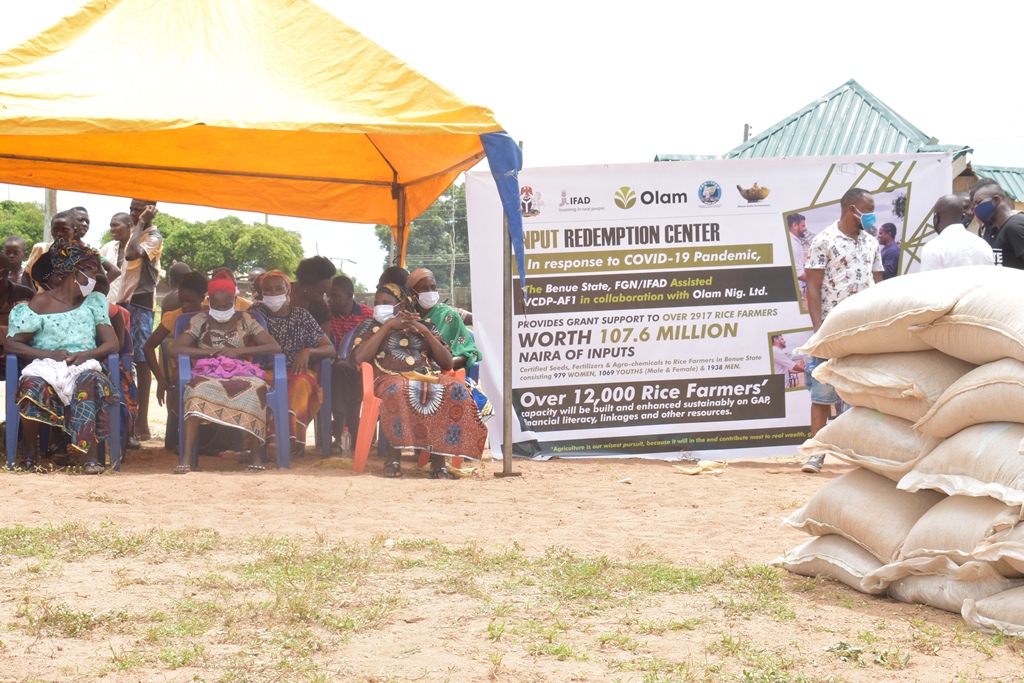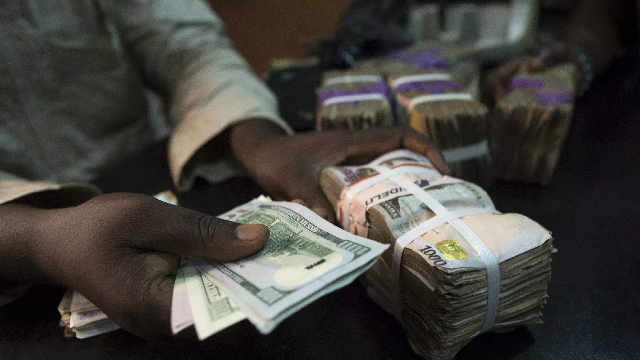The Nigerian economy has received a boost of over N3 billion, arising from the partnership between Olam Nigeria, the International Fund for Agricultural Development (IFAD) and the federal government of Nigeria on the Value Chain Development Programme (VCDP). The programme was launched in 2014 with the aim of generating wealth for smallholder farmers, thereby improving their livelihoods, while also enhancing food security in the country.
The VCDP provides inputs and training to smallholder rice farmers with guaranteed buy back of between 80 to 90 percent of the rice paddy produced by the farmers at competitive market prices while the rest of the rice paddy is reserved by the small holder farmers for personal consumption.
The Olam IFAD VCDP initiative kicked off in 2015 in Benue State with 475 farmers. As at 2020, the programme has been extended to Taraba State with a total of 18,646 registered smallholder farmers. Since inception, Olam has purchased rice paddy worth N3 billion from smallholder farmers in Benue. Olam Nigeria also has rice outgrower initiative programmes apart from its IFAD VCDP partnership where, it has engaged a total of 14,868 smallholder farmers. A breakdown of this figure shows that the company has registered 5000 smallholder farmers in Nasarawa State, 1,200 smallholder farmers in Kebbi State and 8,668 smallholder farmers in Plateau states.
Olam Nigeria has 33,514 smallholder farmers registered under its rice farming initiatives; and the total value of rice paddy it has purchased from the farmers in all the states is valued at over N 4.4 billion.
To kick off the planting season and onboard new farmers to the initiative grants worth over N107 million was presented to 2,917 farmers in Benue State, in the form of inputs as palliatives to cushion the impact of the Covid-19 pandemic on them.
Speaking on the impact of the project, especially with regards to the reduction of poverty in the rural areas, Nadine Gbossa, the Country Representative, IFAD, said that the registered smallholder farmers under the VCDP programme have experienced a 79 per cent increase in their income. She added that the increased income of the farmers has resulted in improving the educational capabilities of their children.
She said: “Before the IFAD OLAM VCDP partnership, many of the smallholder farmers were involved in subsistence farming. However, they are now able to market their produce because a firm like Olam purchases over 90 percent of the rice paddy. They are now generating a significant income and profit. Data shows that the smallholder farmers have increased their income by 79 percent. The number of children attending secondary schools for VCDP households has increased by 17 percent, so it means that more of the farmers are able to send their children to secondary schools, when the norm was just sending them to primary schools. We have seen that the quality of the household in terms of the quality of life is much higher than the national average. So, the impact of VCDP in terms of incomes and in terms of the quality of life through this partnership is quite measurable and with visible evidence.”
The IFAD Nigeria Country Representative further stated that the project has a budget of $329m, adding that IFAD is financing about $250m while the Federal Government of Nigeria and enterprises like Olam finance the difference.
Shedding more light on the VCDP project, Reji George, Vice President- Farming Initiatives, Olam Nigeria said the target of the programme are the rural farmers who reside in the remote areas. According to him, a distinguishing factor of the Olam IFAD VCDP initiative is the decentralized model in terms of the mobilization, registration and engagement with the smallholder farmers.
The decentralized model makes it easier to train farmers in the area of contemporary agronomy practices, provides them with farming inputs while also offering other forms of support. To further ensure transparency, there is a pricing board made up of representatives of the smallholder farmers as well as IFAD and Olam officials which conducts regular market surveys thereby ensuring that the rice paddy produced by the farmers are purchased at competitive market prices.
Speaking on the purchase of the rice paddy from the smallholder farmers, Mr. George said: “About 50 per cent of the total capacity of Olam’s rice mill in Rukubi, Nasarawa State, is gotten through the direct buy back from these programmes from different states. We expect a higher scope this year because while we had 9,757 farmers in 2019, we have doubled the number of registered farmers this year, which is about 18,646 registered farmers. What is significant to us is that this programme has helped us to meet up with the requirement rice paddy for the rice mills in Rukubi in Nasarawa State and Amarava Mill in Kano State.”
He further added that the smallholder farmers have increased their yields from 2 metric tons per hectare when the project kicked in 2015, to an average of 4 metric tons per hectare.
While there are currently about 5,000 registered women smallholder farmers on the project, IFAD’s Nadine Gbossa said the target is to have an equal ratio of 50 percent male to female farmers. According to her, while almost 70 per cent of the activities carried out in the rice and cassava value chain are performed by women, the rewards are not commensurate as compared to the male farmers.
Reji George highlighted that there is an intensive drive to register more women and youth farmers for the project in 2020. He said: “There is a huge grant this year which is being given to farmers to serve as a motivation especially for women and youths. There is a 70 per cent grant component given to the women farmers and 60 per cent grant component given to the youths. They are given in form of inputs under an Investment Stimulation Fund package.”
Shedding more light on the Investment Stimulation Fund, Dr. Ben Odoemena, IFAD Country Program Officer said: “The youth are supported through the fund for two years on a maximum of one hectare per year. We have developed a strategy to ensure that these youths double their productivity and income; and they are going to sell minimum of 80 per cent of the produce, but in reality, most of them are selling all their produce. Evidently, they are making a lot of money from this program. Some of them have acquired over five hectares from the profit they have made from the program since inception. A good number of these youths who participate in the program are doing so well.”
Speaking on other partnerships in the Olam rice value chain, Reji George said: “We are working with OXFAM, in Kebbi State, while we are also engaging GIZ and ADP in Nasarawa and Plateau states. The GIZ’s Green Innovation Centre is our training partner. The Nasarawa Rice farmers program is a partnership with the Grant Assistance for Grassroots Human Security Project (GGP) from the Japanese government for mechanization of harvesting and threshing in a collaboration with Nasarawa ADP.
The rice outgrower model is also being replicated by Olam in the area of tomato production. Caraway Africa Nigeria Limited, a subsidiary of Olam, is embarking on a commercial farm and tomato outgrower initiative in Jigawa State by September 2020. This will cover 2000 tomato outgrowers in 2020, with Olam setting up a 500-hectare commercial farm in Jigawa State. The entire production from both the commercial farm and outgrowers initiative will be for processing in Nigeria. The first harvest of crops is expected in February 2021. The pilot project on tomato farming in Jigawa State conducted between September 2019 and April 2020 resulted in impressive yields of 45 metric tons and 34 metric tons respectively in Olam’s Masama and Guri farms respectively.













